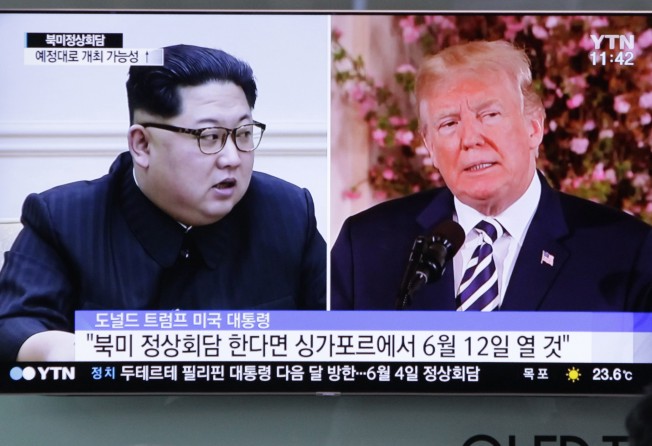Don’t overhype Singapore: the Trump administration should see North Korea negotiations as a process, not a peak
Andrew Hammond says the Trump administration has built expectations to extraordinary heights for a single summit with Kim Jong-un, when the most effective agreements are the product of a laborious process

Russian Foreign Minister Sergei Lavrov is visiting Pyongyang this week, and talks are going on in the US, Singapore and Korea – all signs that the “cancelled” US-North Korea summit could be back on track for June 12 or later. The “on-off” uncertainty surrounding the Singapore session, which reflects the mercurial nature of Kim Jong-un and Donald Trump, is as unsurprising as it is potentially embarrassing for the White House, which would benefit from taking a new approach to the summit.
As this latest episode underlines, while Trump has shown himself sometimes to be an effective – if unorthodox – political campaigner, it is still genuinely unclear what governing competence he will ultimately demonstrate as the first president since Dwight Eisenhower never before to have held elected office. Despite his claims of being a master deal-maker, last week showed how different the political domain can be to that of running a privately held family conglomerate, and underlined his unusual diplomatic style, and continuing political and policy inexperience some 18 months into office.
Despite last week’s cancellation, there are some signs the session could be on again. On Saturday, South Korean President Moon Jae-in made a surprise trip to see Kim; on Tuesday Kim Young-chol, the North Korean vice-chairman, arrived in New York to see US Secretary of State Mike Pompeo; and on Thursday Lavrov is meeting Kim.
Yet, even if the summit now goes ahead in June, or at a later date, a significant potential expectations gap has emerged over what can be achieved in Singapore, and a different approach would be likely to yield a better outcome. Unless behind-the-scenes negotiations between Washington and Pyongyang are much further advanced than is widely reported, it is likely that the summit can be a good start, but not the end, of a sustained strategic dialogue between Trump and Kim.
The potential importance, complexity and tough nature of the talks is as high as those conducted by the Barack Obama administration over the Iran nuclear deal, which took years. Indeed, the final round of these talks alone – between Tehran and the P5+1 – in Lausanne, in March and April 2015, lasted well over a week, which was the longest negotiation at a single site by a US secretary of state since at least the 1978 Camp David Agreement between Israel and Egypt.
Yet, very high expectations have already been built up around the much shorter event in Singapore. Indeed, some have even framed it as a “Nixon goes to China” moment.
Even if Trump emerges with major, unexpected success in Singapore, this Nixon parallel is misleading. One striking factor about his original decision on March 8 to hold a summit with Kim, the first time a sitting US president would meet with a North Korean supreme leader, is how spur of the moment it was, with little detailed preparation. By contrast, Nixon’s visit to see Mao Zedong in Beijing in 1972 came after years of contact-building and diplomacy by the then-US president, national security adviser Henry Kissinger, and others.
Moreover, in recent weeks, it is unclear whether Trump has spent any significant time getting to grips with the details of the North Korean nuclear challenge. He appears instead to have focused on media relations and building up the perceived prestige of the visit.
Even now, it is still not clear that Trump had a comprehensive, clear or coherent strategy towards the Kim meeting, which contains much complexity for the president around US alliances, the non-proliferation regime and what exactly would constitute “denuclearisation” on the peninsula. Complications have sprung up around Kim’s purported “commitment to denuclearisation”.
To Trump, this appears to mean unilateral disarmament. For Kim, it is much more about lengthy negotiations in which North Korea should be treated as an equal to the United States, giving him further propaganda victories. In this context, Kim will probably be wary about making concrete commitments, and want to win economic and political concessions from Trump, before any reduction in nuclear capabilities, let alone committing to “full denuclearisation”.
Aside from Trump’s lack of apparent focus on this complex brief, US preparations have also not been helped by the change period that his foreign policy team is going through, with new Secretary of State Pompeo and new US National Security Adviser John Bolton – a foreign policy hawk who previously called talks with Pyongyang a waste of time, and advocated a pre-emptive military strike.
Indeed, Bolton’s bellicosity appears to have been one reason for the outbreak of tensions this month after he said Washington was taking a “Libyan model” to North Korean disarmament, which apparently spooked Kim with its implicit reference to Muammar Gaddafi’s fall from power after agreeing to dismantle his nascent nuclear weapons programme in 2003.
Taken overall, the wave of uncertainty surrounding the Trump-Kim summit could continue into June, and highlights the lack of previous US preparation. If the summit ultimately goes ahead, the White House would do better to play down expectations about what might come out of Singapore, surprising on the upside with any agreements that do transpire.
Andrew Hammond is an associate at LSE IDEAS at the London School of Economics